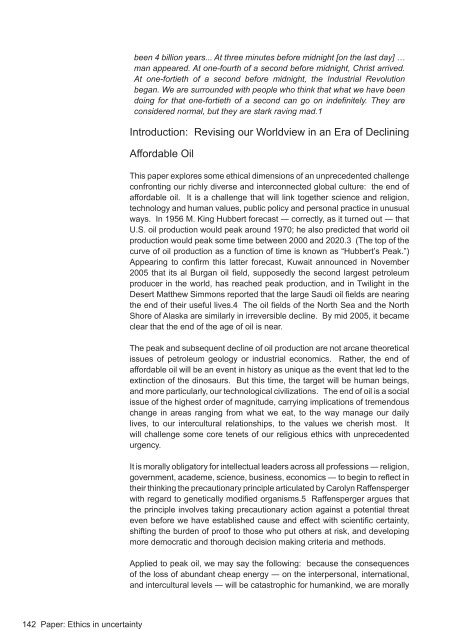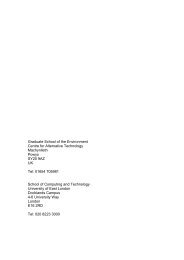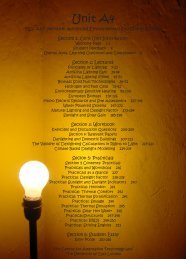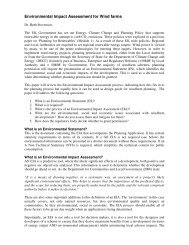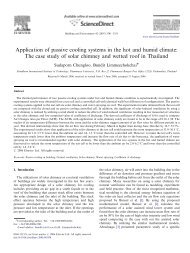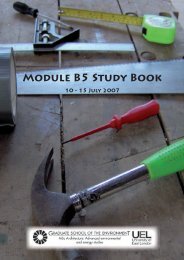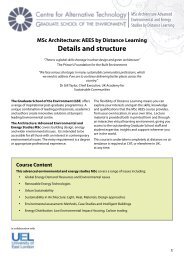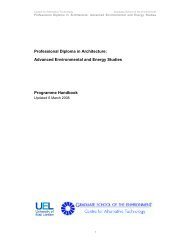Module B1 Study Book - the Graduate School of the Environment
Module B1 Study Book - the Graduate School of the Environment
Module B1 Study Book - the Graduate School of the Environment
You also want an ePaper? Increase the reach of your titles
YUMPU automatically turns print PDFs into web optimized ePapers that Google loves.
een 4 billion years... At three minutes before midnight [on <strong>the</strong> last day] …<br />
man appeared. At one-fourth <strong>of</strong> a second before midnight, Christ arrived.<br />
At one-fortieth <strong>of</strong> a second before midnight, <strong>the</strong> Industrial Revolution<br />
began. We are surrounded with people who think that what we have been<br />
doing for that one-fortieth <strong>of</strong> a second can go on indefinitely. They are<br />
considered normal, but <strong>the</strong>y are stark raving mad.1<br />
Introduction: Revising our Worldview in an Era <strong>of</strong> Declining<br />
Affordable Oil<br />
This paper explores some ethical dimensions <strong>of</strong> an unprecedented challenge<br />
confronting our richly diverse and interconnected global culture: <strong>the</strong> end <strong>of</strong><br />
affordable oil. It is a challenge that will link toge<strong>the</strong>r science and religion,<br />
technology and human values, public policy and personal practice in unusual<br />
ways. In 1956 M. King Hubbert forecast ― correctly, as it turned out ― that<br />
U.S. oil production would peak around 1970; he also predicted that world oil<br />
production would peak some time between 2000 and 2020.3 (The top <strong>of</strong> <strong>the</strong><br />
curve <strong>of</strong> oil production as a function <strong>of</strong> time is known as “Hubbert’s Peak.”)<br />
Appearing to confirm this latter forecast, Kuwait announced in November<br />
2005 that its al Burgan oil field, supposedly <strong>the</strong> second largest petroleum<br />
producer in <strong>the</strong> world, has reached peak production, and in Twilight in <strong>the</strong><br />
Desert Mat<strong>the</strong>w Simmons reported that <strong>the</strong> large Saudi oil fields are nearing<br />
<strong>the</strong> end <strong>of</strong> <strong>the</strong>ir useful lives.4 The oil fields <strong>of</strong> <strong>the</strong> North Sea and <strong>the</strong> North<br />
Shore <strong>of</strong> Alaska are similarly in irreversible decline. By mid 2005, it became<br />
clear that <strong>the</strong> end <strong>of</strong> <strong>the</strong> age <strong>of</strong> oil is near.<br />
The peak and subsequent decline <strong>of</strong> oil production are not arcane <strong>the</strong>oretical<br />
issues <strong>of</strong> petroleum geology or industrial economics. Ra<strong>the</strong>r, <strong>the</strong> end <strong>of</strong><br />
affordable oil will be an event in history as unique as <strong>the</strong> event that led to <strong>the</strong><br />
extinction <strong>of</strong> <strong>the</strong> dinosaurs. But this time, <strong>the</strong> target will be human beings,<br />
and more particularly, our technological civilizations. The end <strong>of</strong> oil is a social<br />
issue <strong>of</strong> <strong>the</strong> highest order <strong>of</strong> magnitude, carrying implications <strong>of</strong> tremendous<br />
change in areas ranging from what we eat, to <strong>the</strong> way manage our daily<br />
lives, to our intercultural relationships, to <strong>the</strong> values we cherish most. It<br />
will challenge some core tenets <strong>of</strong> our religious ethics with unprecedented<br />
urgency.<br />
It is morally obligatory for intellectual leaders across all pr<strong>of</strong>essions ― religion,<br />
government, academe, science, business, economics ― to begin to reflect in<br />
<strong>the</strong>ir thinking <strong>the</strong> precautionary principle articulated by Carolyn Raffensperger<br />
with regard to genetically modified organisms.5 Raffensperger argues that<br />
<strong>the</strong> principle involves taking precautionary action against a potential threat<br />
even before we have established cause and effect with scientific certainty,<br />
shifting <strong>the</strong> burden <strong>of</strong> pro<strong>of</strong> to those who put o<strong>the</strong>rs at risk, and developing<br />
more democratic and thorough decision making criteria and methods.<br />
Applied to peak oil, we may say <strong>the</strong> following: because <strong>the</strong> consequences<br />
<strong>of</strong> <strong>the</strong> loss <strong>of</strong> abundant cheap energy ― on <strong>the</strong> interpersonal, international,<br />
and intercultural levels ― will be catastrophic for humankind, we are morally<br />
142 Paper: Ethics in uncertainty


